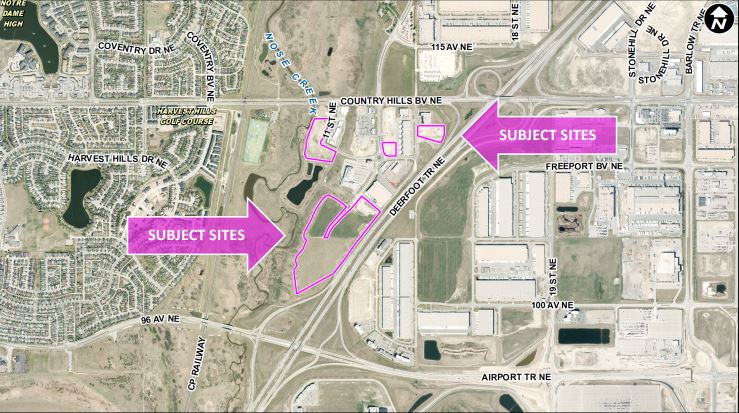Calgary city council has approved an application to rezone a series of properties along Nose Creek, despite advocacy from community members to protect the natural land in the area.

The privately-owned properties in front of council are part of the Stoney Industrial Area, a large segment of land previously dedicated to industrial and commercial businesses along Deerfoot Trail between Stoney Trail to Airport Trail.
With little development in the area over the years, it’s become a well-used park space for residents in the Northern Hills communities.
The application by Urban Systems, on behalf of Melcor, asked the city to rezone four properties near Nose Creek in an effort “to expand the list of uses and market opportunities in the area.”
However, the property owner hasn’t applied for any development permits on the site.
On Tuesday, council voted 13-1 in favour of the application with only Ward 2 Coun. Jennifer Wyness opposed.
It was disappointing but not unexpected for Andrew Yule, the founder of Save Nose Creek — a group advocating to protect the green space in the Nose Creek Valley.

Get daily National news
“There are possibilities down here in the creek and we want to make sure that we do it now because it’s now or never,” Yule said. “As Stoney Industrial Area expands out, there’s not going to be a green space to make a park.”
One of the goals of the Save Nose Creek group is to get regional park designation from the city and provincial and national park designation from other orders of government to ensure the natural land near the creek is protected from development.
“I appreciate that my residents are concerned about the health of Nose Creek. I’m there with them and I’m willing to work on some things that I think are going to be reasonable,” Ward 3 Coun. Jasmine Mian told reporters following council’s decision.
“We can’t as a city just go buy up a bunch of industrial land and turn it into a park.”
According to Mian, there is work underway to find a suitable location for a regional park in Ward 3.
One of the concerns of the Save Nose Creek group is the proximity of a future development site to the creek and the potential for waste and contamination.
“We’re pushing for the setbacks to be pushed back to 300 feet,” Yule said.
That concern was shared in a report on the application from city administration, which stated “that particular care and attention must be paid” to ensure overland stormwater runoff into the creek is controlled to protect from contamination.
According to administration, those considerations will be made when the property owner applies for a development permit.
Mike Coldwell, with Urban Systems, told council that several studies on environmental impacts and the proximity to Nose Creek were done back in 2009 when the original land-use application was brought to council.
“The different studies and setbacks have been established and impact assessments have been completed that are satisfying to the city,” Coldwell said. “We are not talking about amending any of the boundaries or any of the areas adjacent to the creek.”
Despite the approval of the rezoning from city council, Yule said the group will continue to advocate to the city, province and federal government for the creation of the park in the Nose Creek Valley.
“We want to make sure that the voice of Nose Creek is being heard,” Yule told reporters. “I think in previous generations we haven’t heard that.”



Comments